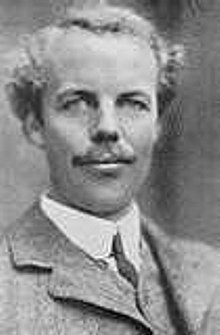Arthur Cecil Pigou
Arthur Cecil Pigou (born November 18, 1877 in Ryde , Isle of Wight , † March 7, 1959 in Cambridge ) was an English economist . He is considered a representative of the Cambridge School of Neoclassicism and made a name for himself in welfare , economic and monetary theory .
Life
Arthur Cecil Pigou introduced the concept of the Pigou tax , named after him, in 1920, which aims to curb environmental pollution. He advocated the idea of progressive tax , which he - like Francis Edgeworth - justified with the decreasing marginal utility of income . In 1920 he dealt with price differentiation , and thus the skimming off of consumer surplus in favor of producer surplus .
In the 1920s, he first used the term Quality of Life ( quality of life ), the in the 1960s, Lyndon B. Johnson took up and spread. Pigou held extensive discourses with John Maynard Keynes .
He was a member of the Royal Netherlands Academy of Sciences since 1921. In 1927 he was elected a member of the British Academy . In 1928 Pigou was elected to the American Academy of Arts and Sciences . In 1955 he was awarded the international Antonio Feltrinelli Prize .
See also
Fonts
- Wealth and Welfare, London (1912)
- The Economics of Welfare (1920)
- The Theory of Unemployment, London (1933)
- Essays in Economics, London (1952)
literature
- Ian Kumekawa: The first serious optimist. AC Pigou and the Birth of Welfare Economics . Princeton University Press, Princeton 2017, ISBN 978-0-691-16348-2 .
Web links
- Literature by and about Arthur Cecil Pigou in the catalog of the German National Library
- Arthur Cecil Pigou (English)
- Arthur Cecil Pigou: The Problem of Theism, and other essays. London, Macmillan and Co., 1908.
Individual evidence
- ↑ Alban Knecht: Producing quality of life. A resource theory and power analysis. VS-Verlag, Wiesbaden 2010, p. 16.
- ↑ Alban Knecht: Producing quality of life. A resource theory and power analysis. VS-Verlag, Wiesbaden 2010, p. 18.
- ^ Deceased Fellows. British Academy, accessed July 17, 2020 .
| personal data | |
|---|---|
| SURNAME | Pigou, Arthur Cecil |
| BRIEF DESCRIPTION | English economist |
| DATE OF BIRTH | November 18, 1877 |
| PLACE OF BIRTH | Ryde , Isle of Wight , England |
| DATE OF DEATH | March 7, 1959 |
| Place of death | Cambridge , Cambridgeshire |
